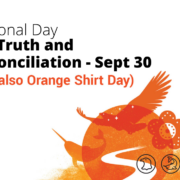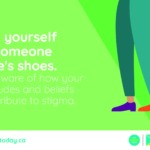National Day for Truth and Reconciliation – Wear an orange shirt on the 29th or 30th
National Day for Truth and Reconciliation – September 30th
Menno Place is honouring Truth and Reconciliation Day on both September 29th and 30th consistent with our ongoing commitment to Indigenous communities. The official recognition day is September 30th. Please wear an orange shirt in recognition on either or both of these days. If you aren’t working on the 30th, please wear an orange shirt on 29th. CLICK HERE FOR INFORMATION ABOUT THE STAT HOLIDAY
- Why the National Day for Truth and Reconciliation isn’t just another stat holiday – CLICK HERE
- What is Orange Shirt Day? This day is also recognized on September 30 – CLICK HERE
- What is the response of the Mennonite Community? CLICK HERE to read MCC Canada’s response to the Truth and Reconciliation Commission – Calls to Action #48 and #49
6 ways to deepen your understanding of Indian residential school history
This article is written by Carolyn Ali and is published here
September 30 is a day of commemoration. Every year since 2013, Orange Shirt Day has aimed to raise awareness of the Indian residential school system in Canada. The federal government has now officially marked the date as National Day for Truth and Reconciliation, and the BC government has followed suit.
National Day for Truth and Reconciliation is an opportunity to recognize and commemorate the legacy of residential schools. So how can you use this day to advance your personal understanding of residential school history? Here are six places to start.
1. Read about residential school history
This summary by the National Centre for Truth and Reconciliation explains why the Truth and Reconciliation Commission of Canada (TRC) concluded in its final report that the Indian Residential School system was cultural genocide. Residential schools were “a systematic, government-sponsored attempt to destroy Aboriginal cultures and languages and to assimilate Aboriginal peoples so that they no longer existed as distinct peoples.”
2. Know the historic timeline
Produced by Historica Canada, this five-minute video starts in the 17th century and highlights significant dates in the history of residential schools, all the way up to the release of the Truth and Reconciliation Commission of Canada’s final report in 2015.
3. Learn about residential school denialism
Co-authored by Dr. Daniel Health Justice, who is a Cherokee Nation citizen and Professor of Critical Indigenous Studies and English at UBC, this article emphasizes that we need “truth before reconciliation.” It presents 8 ways to identify and confront Residential School denialism, which obscures the truth about Canada’s Indian Residential School system in ways that protect the status quo.
4. Honour the stories of Survivors
A good place to start is by watching this short video of Phyllis Webstad telling her story, which is the inspiration for Orange Shirt Day. You can also hear Webstad speak following a film screening of Returning Home and Pathways to Reconciliation on September 27. For online viewing, the Legacy of Hope Foundation also has a collection of videos that share first-person stories of Survivors.
5. Learn about UBC’s role in residential school history
When UBC’s Indian Residential School History and Dialogue Centre opened at UBC in 2018, UBC President Santa J. Ono delivered an apology to residential school Survivors and Indigenous people for the university’s involvement in the system that supported the operation of the schools. This statement explains why this apology is so necessary.
6. Participate in a community event
UBC’s Indian Residential School History and Dialogue Centre has a calendar of events surrounding Orange Shirt Day from mid-September through November, and most events are virtual. These include a September 21 documentary screening of Picking Up the Pieces: The Making of the Witness Blanket and an October 12 lecture on Defining Meaningful Allyship in the Quest for Reconciliation.
Carolyn Ali is a writer for UBC Brand and Marketing.





